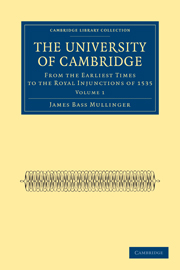Book contents
- Frontmatter
- PREFACE
- Contents
- CHAP. I FROM THE ROYAL INJUNCTIONS OF 1535 TO THE FOUNDATION OF TRINITY COLLEGE
- CHAP. II FROM THE FOUNDATION OF TRINITY COLLEGE TO THE ACCESSION OF ELIZABETH
- CHAP. III FROM THE ACCESSION OF ELIZABETH TO THE DEATH OF ARCHBISHOP PARKER
- CHAP. IV FROM THE DEATH OF ARCHBISHOP PARKER TO THAT OF LORD BURGHLEY
- CHAP. V COLLEGE LIFE
- CHAP. VI FROM THE DEATH OF LORD BURGHLEY TO THE ACCESSION OF CHARLES I
- APPENDIX
- INDEX
CHAP. II - FROM THE FOUNDATION OF TRINITY COLLEGE TO THE ACCESSION OF ELIZABETH
Published online by Cambridge University Press: 05 November 2011
- Frontmatter
- PREFACE
- Contents
- CHAP. I FROM THE ROYAL INJUNCTIONS OF 1535 TO THE FOUNDATION OF TRINITY COLLEGE
- CHAP. II FROM THE FOUNDATION OF TRINITY COLLEGE TO THE ACCESSION OF ELIZABETH
- CHAP. III FROM THE ACCESSION OF ELIZABETH TO THE DEATH OF ARCHBISHOP PARKER
- CHAP. IV FROM THE DEATH OF ARCHBISHOP PARKER TO THAT OF LORD BURGHLEY
- CHAP. V COLLEGE LIFE
- CHAP. VI FROM THE DEATH OF LORD BURGHLEY TO THE ACCESSION OF CHARLES I
- APPENDIX
- INDEX
Summary
Condition of the university in the first year of Edward VI
The changes which followed upon the accession of the young king must, at first sight, have seemed to give good promise that the well-wishers to learning would now at length find full scope for their designs. Gardiner, proving contumacious, was committed to the Fleet and there underwent a short term of imprisonment. He was succeeded in the chancellorship by the duke of Somerset, the lord protector of the realm and guardian to the king, well-known as a patron of the arts and of letters and a warm supporter of the Reformation. The university charters and privileges were confirmed, although not without involving the community in exorbitant expense. The fear of dissolution and confiscation was for a time dispelled; and while colleges, chantries, and grammar schools elsewhere throughout the land fell a prey to the despoiler, and Parker pleaded in vain for his beloved college at Stoke and Ascham deplored the imminent ruin of Sedberg, none of the Cambridge foundations (Trinity excepted) suffered material injury or loss.
Testimony of Walter Haddon to its prosperity
To a superficial observer, indeed, the university now began to wear an aspect of undeniable prosperity. ‘Never,’ said Walter Haddon, at the academic Commencement of 1547, ‘do I remember to have seen it more affluent or more thronged.’ Among other signs of a revival, the re-appointment of ‘taxors,’ in the preceding October, is noted by Dr Peacock as one of the earliest,—although the measure may perhaps have been rendered imperative by the occurrence of fresh disputes between the university and the town.
- Type
- Chapter
- Information
- The University of Cambridge , pp. 87 - 165Publisher: Cambridge University PressPrint publication year: 2009First published in: 1873

